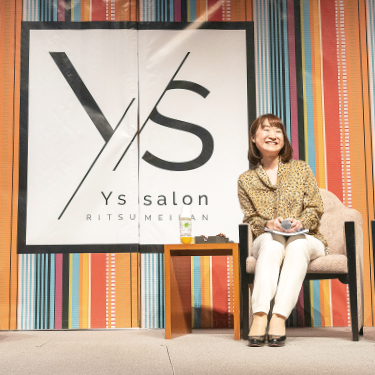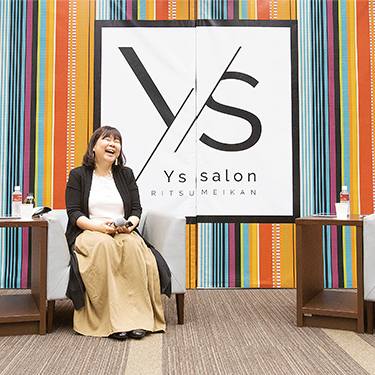Theme:“Making things your own without hesitation”
The potential for Multi-purpose Jelly Food, a delicious melon jelly developed using system design techniques
Guest:Tomomi Nonaka/Associate Professor, College of Gastronomy Management, Ritsumeikan University
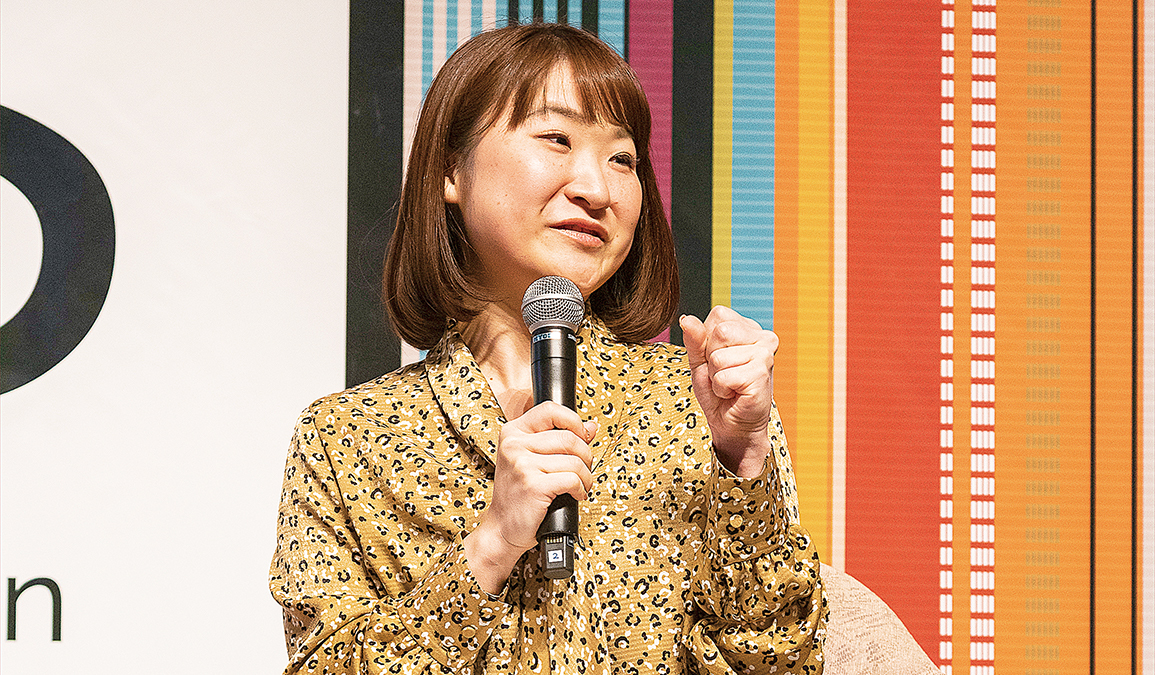
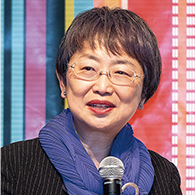
Moderator:
Yoko Matsubara
Vice Chancellor of The Ritsumeikan Trust and Vice President of Ritsumeikan University, Professor
<Research Field>
history of science; bioethics; science, technology and society studies
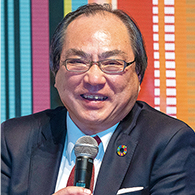
Host:
Yoshio Nakatani
Chancellor of The Ritsumeikan Trust and President of Ritsumeikan University, Professor
<Research Field>
disaster prevention information systems, artificial intelligence, human interface, cognitive engineering, memory engineering, affective engineering
The second Ys Salon event was held on the Biwako-Kusatsu Campus with guest Associate Professor Tomomi Nonaka from the College of Gastronomy Management.
Established in 2018, the College of Gastronomy Management offers the opportunity to learn about gastronomy, one of the most basic of human activities, through the lenses of the humanities, social sciences, and natural sciences; it is, moreover, the first college in Japan to conduct comprehensive research into the subject.
Associate Professor Nonaka’s presentation embodied the college’s unique slogan: “Savor the World”. Indeed, one member of the audience was so inspired by the implications, he sought to ask advice on how to lead life as a researcher. Complemented ably by Chancellor Nakatani, and Vice Chancellor Matsubara, who each spoke passionately about their lives as researchers, Associate Professor Nonaka’s reply went above and beyond.
A lesson from hybrid vehicles: The importance of sustainable production
Nonaka I have given my presentation today the title: “From Cars to Japanese Sake: Future food system design”; and the hope is it will help us all think together about the topic of food sustainability.
My area of expertise is systems engineering, and I conduct research on production systems, engineering, and service engineering - centered on the key concept of sustainable manufacturing. Before joining the College of Gastronomy Management, I used to research automobile production.
Some of you may be wondering why someone who used to research automobiles is now working in a college that specializes in food. For me, however, my approach has not changed. The only thing that has changed is my research focus, from cars to food. I think any topic can be viewed in terms of systems design. In other words, when you view a subject in terms of systems, the process of design is the same regardless of the subject: you determine what elements comprise that subject, analyze how those elements interact with each other, as well as with other outside factors; and, using this information, you can design the entire system.
My automobile research focused on assessing the sustainability of diffusion scenarios for clean energy vehicles such as electric vehicles (EVs) and hybrid vehicles. I used scenario analysis to combine various elements, including technological advancement, economic growth, consumer preferences, and demographic trends, and explored sustainability in terms of environmental assessment and economic potential. It was right around the time when it became “cool” to drive an environmentally-friendly car. That is when the hybrid car Prius made headlines for placing second in the number of cars sold in Japan, and the news reported that Leonardo DiCaprio drove a Prius. Even the Ministry of the Environment had released a scenario aiming for 100% of car models produced in Japan to be EVs and for all the cars in the world to be EVs and hybrids, rather than gasoline-powered cars by 2050. But is it really acceptable to only allow EVs and hybrids on the road? To really get to the bottom of this issue, I had to consider the entire life cycle of a vehicle.
For example, I compared the amount of CO2 emissions from a hybrid car and a similarly rated gasoline-powered car over their entire life cycles. I used the data at the time of rating, so the outcomes would be different with current data, but I found that, while the total CO2 emissions over the life cycle of a hybrid car are about half of those of a gasoline-powered car, in the production phase the absolute amount of CO2 emissions is actually slightly higher.
This is because special materials and technologies are used in the production of batteries. My study revealed that the environmental impact of the production phase for environmentally- friendly products, including, but not limited to, cars is increasing. Given that environmentally-friendly products will only proliferate going forward, considering ways to make production sustainable takes on an extra special significance.
Here, the multifaceted nature of sustainability really comes to the fore when one takes into account an overview - from production to disposal - of the system as a whole, factoring in complex factors such as technological progress, global production, the effects of time and space, as well as short, medium, and long-term perspectives.
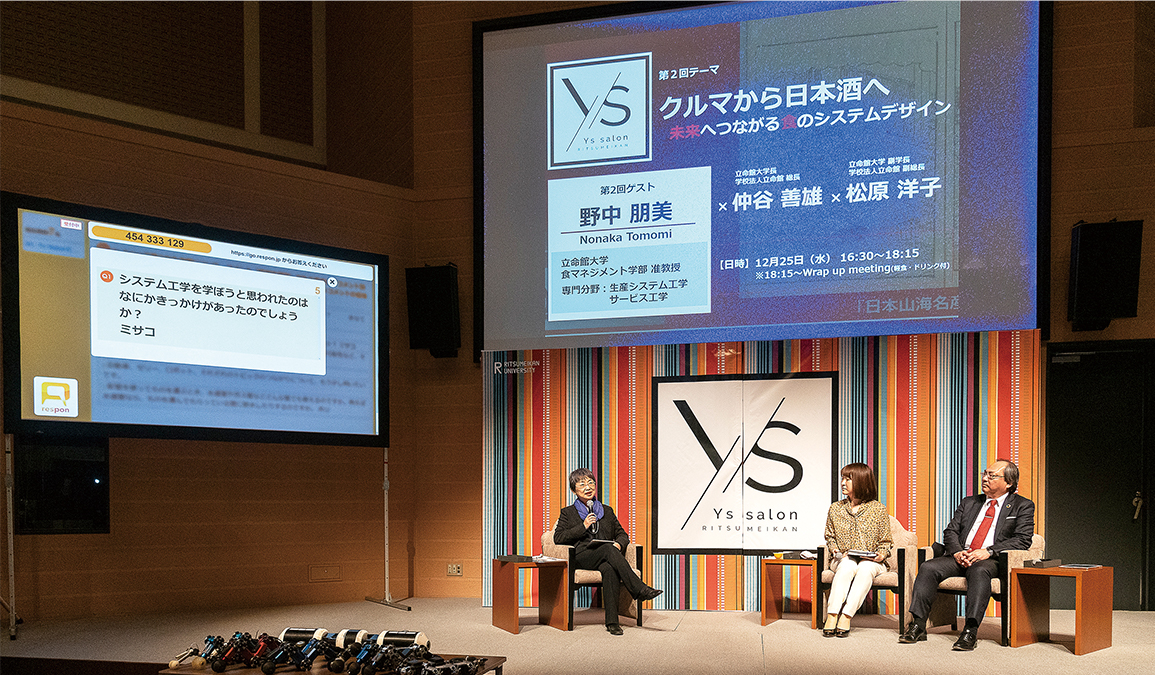
Sustainability is not necessarily just a matter of being ascetic
So, what meaning has the word ‘sustainability’ taken on? I think we are all used to hearing the word, but let’s stop for a moment to examine what it really means.
Recognition of the word sustainability has grown throughout the world since it first appeared in a United Nations report in 1987. In that report, sustainability was defined as ‘meeting the needs of the present without compromising the ability of future generations to meet their own needs.’ Although taking a mid-to- long-term perspective of the future is important, the key part of this definition is ‘meeting the needs of the present.’ It does not mean living an ascetic life for the sake of future generations.
After the report was published, discussions on the environment largely focused on reducing CO2 emissions and how to avoid the depletion of resources, but this has changed over the years such that now the emphasis is very much on the importance of assessing sustainability from multiple angles, centered on the three pillars of the environment, society, and the economy.
Shifting my focus from Cars to Food after joining the College of Gastronomy Management
More recently talk of sustainability around the world has begun to focus on food related social issues.
We have been hearing more about reducing food loss, various dietary possibilities, such as insects and lab- grown meat, and other kinds of food research. The lone factor underpinning all these discussions is the pressing issue of food supply. We already know that our current approach to food will not be able to sustain the world’s increasing population. According to the UN Food and Agriculture Organization (FAO), global agricultural production in 2050 will need to be increased by 60%. This issue can be addressed as a system design problem— namely, what should we eat to ensure we can lead happy lives.
Amid this backdrop, since I joined the College of Gastronomy Management, I have been applying research on food sustainability to explore how we can assess food sustainability from multiple angles. And, since shifting my research focus to food, what I have concluded is that as long as we continue using conventional production methods we cannot guarantee food sustainability.



